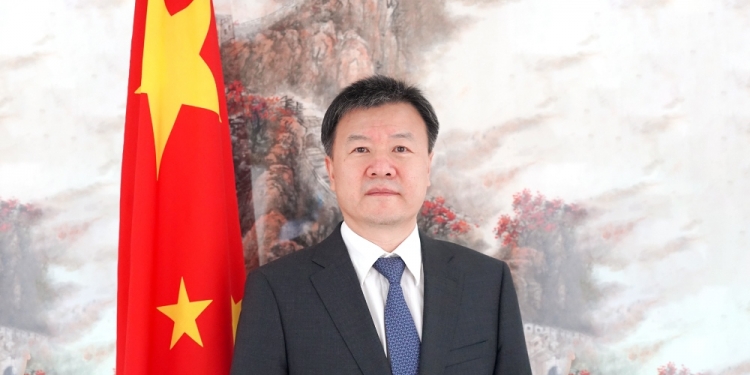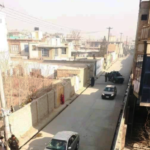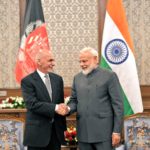Since the 18th National Congress of the Communist Party of China (CPC), Chinese President Xi Jinping has, on the basis of a deep understanding of the trend of history, put forward a series of new strategic, forward-looking and science-based ideas and concepts to unite and lead the Chinese people of all ethnic groups towards building a moderately prosperous society and ending absolute poverty in their new journey, to build China into a modern socialist country in an all-round way. In 2014, Xi put forward the creative holistic view of national security, laying out plans for China to improve its security work system, enhance its capacity and capabilities for national security and strengthen regional security cooperation, which will guide China-Afghanistan security cooperation to a new high.
The holistic view of national security embodies the national security values, approaches, institutions and mechanisms with Chinese characteristics. It represents the pursuit of an integrated national security system covering the political, homeland, military, economic, cultural, societal, science and technology, information, ecological, resource and nuclear aspects in response to today’s complex security challenges. Since the outbreak of COVID-19, China’s has been guided by the holistic view of national security in its fight against the pandemic. With President Xi’s forward-looking views on non-traditional security such as those on biological security, the Chinese government has stuck to the people-centered approach, strengthened the awareness of potential dangers with a sense of fighting spirit, and worked resolutely to successfully control the pandemic, thus safeguarding the safety and health of the Chinese people and contributing to the protection of people in other parts of the world.
According to the holistic view of national security, China consistently pursues common, comprehensive, cooperative and sustainable security in its exchanges with the neighboring countries. To be more specific, common means that security should be universal and equal, with the security interests of each and every country respected and protected; it should be comprehensive, covering both traditional and non-traditional fields protected in a coordinated way; security in all countries and regions should be achieved and promoted in a cooperative way through dialogues and consultation; and it should be made sustainable and durable by putting equal emphasis on development and security.
A wise man adapts himself as circumstances change. Unlike the old security concept of building military alliances and strengthening armaments, the concept of common, comprehensive, cooperative and sustainable security is aimed at achieving lasting peace and common development in the region through cooperation and openness rather than confrontation or alliance. It involves multiple dimensions and takes into account differences in security situations among countries, complex contradictions in non-traditional fields and imbalances in economic and social development. Its approaches and connotations are more in line with the historical background and complex current situation of national security problems in the region, such as that in Afghanistan. Such a concept provides methods to address the most prominent security problems and offer an approach to deal with various potential threats in a coordinated way. Bearing it in mind, China has contributed its wisdom and solution to tackle the Afghan question and other regional hotspots.
Not long ago, the China Institute of International Studies (CIIS) held an international seminar on joint response to terrorism under the new circumstances. Vice Foreign Minister Luo Zhaohui attended and addressed the meeting. It is pointed out that non-traditional security threats require transnational responses, which should be based on a coherent and sustainable approach, with a long-term view instead of knee-jerk reaction. Opting for unilateralist and bullying practices, certain countries have politicized counter-terrorism and turned it into a convenient tool. This has caused serious disruption to international counter-terrorism cooperation, and we all need to be on high alert. In international counter-terrorism cooperation, it is important to uphold international consensus, adopt effective measures, follow a unified standard and deny terrorism its breeding ground.
Participants agreed that the pandemic has complicated and aggravated the international counter-terrorism situation, but the international community should uphold multilateralism, strengthen solidarity and jointly deal with non-conventional security threats including terrorism. We should apply a unified standard and reject double standards unequivocally. We should firmly defend international consensus and oppose the selfish politicization and instrumentalization of counter terrorism. We should adopt comprehensive measures to address both the symptoms and root causes of terrorism, pay attention to preventive counter terrorism and deradicalization, and strive to eradicate the breeding ground for terrorism. We should be open-minded and inclusive and avoid linking terrorism with any particular countries, ethnicity or religion.
Afghanistan has been in protracted war for 40 years. China has always respected the sovereignty, independence and national dignity of Afghanistan and has never bullied it. In the security community of China and Afghanistan, the security and stability of Afghanistan serve China’s interests. In November 2020, at the 20th meeting of the Council of Heads of States of the Shanghai Cooperation Organization (SCO), President Xi Jinping once again stressed the importance of Afghanistan to regional security and stability and reaffirmed the Chinese commitment to help Afghanistan to achieve peace and reconstruction. Over the years, China has strengthened its counter-terrorism and security cooperation with Afghanistan through bilateral channels, reaffirmed at the China-Afghanistan-Pakistan Trilateral Foreign Ministers’ Dialogues its determination to combat terrorism. China supports Afghanistan in its counter-terrorism efforts through the SCO and the Quadrilateral Cooperation and Coordination Mechanism in counter-terrorism by the armed forces of China, Afghanistan, Pakistan and Tajikistan, actively participates in the international multilateral mechanisms on the Afghan question, supports the various decisions made by Afghanistan, oppose any intervention in the internal affairs of Afghanistan by any external force under any pretext, call for an orderly and responsible withdrawal of foreign troops from Afghanistan, and support the realization of lasting peace in Afghanistan.
In addition, China supports Afghanistan’s efforts to resolve security issues through development. Since the start of Peace and Reconstruction in Afghanistan, China has attached great importance to cooperation with Afghanistan in such areas as economy and trade, infrastructure construction and energy development, opened up transport corridors and provided market access for specialty products such as pine seeds, saffron and carpets. Efforts have been made to promote connectivity between Afghanistan and the surrounding region within the BRI framework and help the country to make full use of its geographical advantages, build its own capacity and achieve self-sufficiency at an early date. Since the outbreak of COVID-19 in Afghanistan last year, China has given full support to its fight against the epidemic. Six batches of over 20 tons of pandemic response supplies have been delivered to Afghanistan. We purchased and distributed essential foods for residents in Kabul when the prices skyrocketed. Recently, the Chinese side has started to provide winter supplies for the cold northern provinces. A large amount of Chinese food aid has also arrived. We hope to help the Afghan people to have a warm winter.
China has never wavered in its determination to go hand in hand with Afghanistan. China will continue making use of its advantages and international status to assist the Afghanistan peace and reconciliation process to move forward in an orderly manner, work with Afghanistan to actively implement the Memorandum of Understanding on Jointly Promoting the Belt and Road Initiative and try its best to help Afghanistan in economic and social development and security capacity building. We stand ready to work with Afghanistan for a happy and bright future.













